Key takeaways:
- Consider total compensation beyond base salary, including benefits like health insurance, retirement contributions, and paid time off.
- Research market rates and gather insights from networking to understand reasonable salary expectations.
- Assess company culture and alignment with personal values to enhance job satisfaction and long-term happiness.
- Thorough research and candid conversations with employees can reveal critical insights about a company’s stability and working environment.
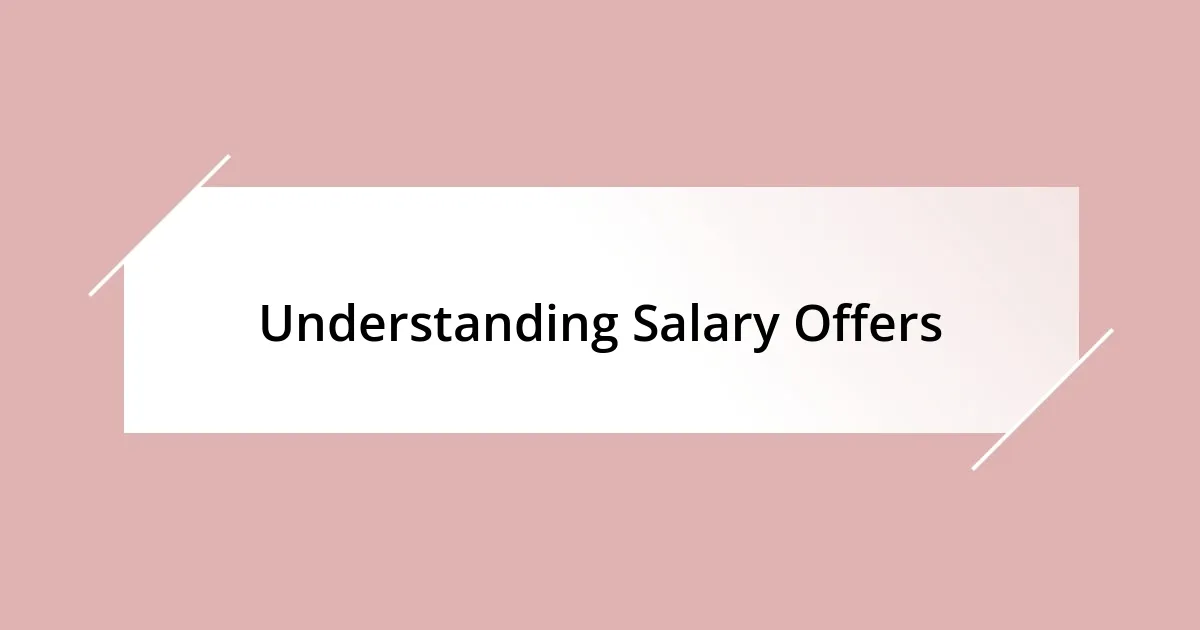
Understanding Salary Offers
Understanding salary offers can often feel overwhelming, especially when you’re navigating the complexities of compensation packages. I remember a time when I was faced with two offers that looked very similar on paper. Have you ever found yourself in a situation where numbers seemed like they were screaming at you, yet the decision felt like a silent whisper?
It’s essential to look beyond the base salary and consider the total compensation. For me, evaluating benefits such as health insurance and retirement contributions was a game-changer. Once, a seemingly lower-paying job turned out to have an incredible health plan and generous vacation days, making it a much more appealing option in the long run. Isn’t it fascinating how a few extra perks can tilt the scales in favor of one offer over another?
Additionally, I learned that location plays a significant role in salary evaluation. When I accepted a position in a bustling city, the cost of living hit harder than I anticipated. Have you ever calculated what your salary translates to in terms of your expenses? Recognizing these factors helped me make more informed decisions and ultimately led to a salary that not only met my needs but also matched my lifestyle aspirations.

Researching Market Rates
Researching market rates is an essential step, and I can’t stress enough how valuable it is to gather insights from various sources. When I started looking for a new job, I utilized websites like Glassdoor and PayScale to gauge the average salaries for my specific role in my industry. I remember feeling a mixture of excitement and anxiety while discovering the range; it was eye-opening to see how much variation existed based on experience and location. Have you ever found a salary range that left you stunned or inspired?
Another valuable resource was networking. I engaged with colleagues and mentors to get their perspectives, which helped me understand what was reasonable. One evening, I attended a local meet-up where I casually brought up salary discussions. It was fascinating to hear others share their experiences and negotiate tips, which empowered me in my own conversations. Networking can provide you with the inside scoop that websites sometimes miss.
Comparing job offers is more than just numbers; it gives you insight into the industry landscape. As I analyzed multiple offers, I created a comparison table to make sense of the data clearly. This approach brought everything into perspective and allowed me to see what each company valued, helping me prioritize what mattered most to me.
| Company | Base Salary | Health Benefits | Retirement Contributions |
|---|---|---|---|
| Company A | $70,000 | Standard | 3% Match |
| Company B | $68,000 | Comprehensive | 5% Match |
| Company C | $72,000 | Standard | 4% Match |
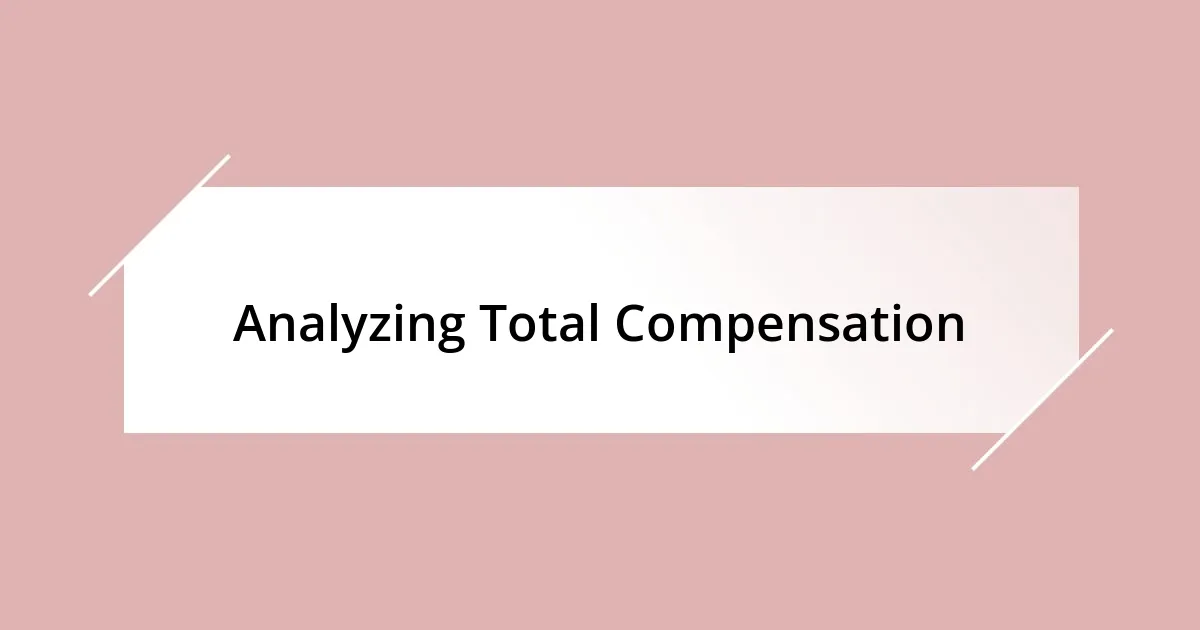
Analyzing Total Compensation
Evaluating total compensation goes beyond just comparing numbers; it’s about understanding the full picture. I remember going through a particularly enlightening experience with a job offer where the salary looked great until I discovered the details of the benefits. Suddenly, the offer didn’t seem as attractive once I learned about the limited healthcare options. It taught me that these components can drastically change the overall value of a job offer.
Here are some key factors to consider when analyzing total compensation:
- Health Insurance: Look at the coverage details and the employee contribution.
- Retirement Plans: Check for employer matches and the types of plans offered.
- Bonuses and Stock Options: Consider not just the salary but potential earnings through bonuses or equity.
- Paid Time Off (PTO): Evaluate vacation days, sick leave, and other time-off policies.
- Professional Development: Assess if the company provides educational reimbursements or training opportunities.
Another time, I had an offer with a higher base salary, but the company culture and work-life balance played a critical role in my final decision. I realized that while a few extra dollars can seem enticing on paper, they might not compensate for job satisfaction or the overall quality of life. It’s this blend of quantitative and qualitative factors that often makes the difference in determining the true attractiveness of a salary offer.

Evaluating Job Benefits
When evaluating job benefits, it’s crucial to dissect each component thoughtfully. I once received an offer with an impressive-sounding salary, but I quickly realized that the health benefits were surprisingly limited. This experience drove home the lesson that not all attractive numbers translate to real-life value. Have you ever felt a job offer lost its luster after breaking down the benefits?
I also found that retirement contributions played a significant role in my evaluations. There was a time when I favored a company that offered a modest salary but a generous retirement match. Knowing that the company was committed to helping me secure my financial future made me feel valued beyond just my day-to-day contributions. It’s moments like these that truly illustrate the importance of assessing benefits comprehensively.
Lastly, I highly recommend considering the intangibles, such as the company’s culture and work-life balance. I remember turning down a seemingly lucrative job due to a gut feeling about its demanding hours. In my experience, a role that supports my lifestyle and aligns with my values is worth its weight in gold. After all, what’s a higher salary if it comes at the cost of your well-being?
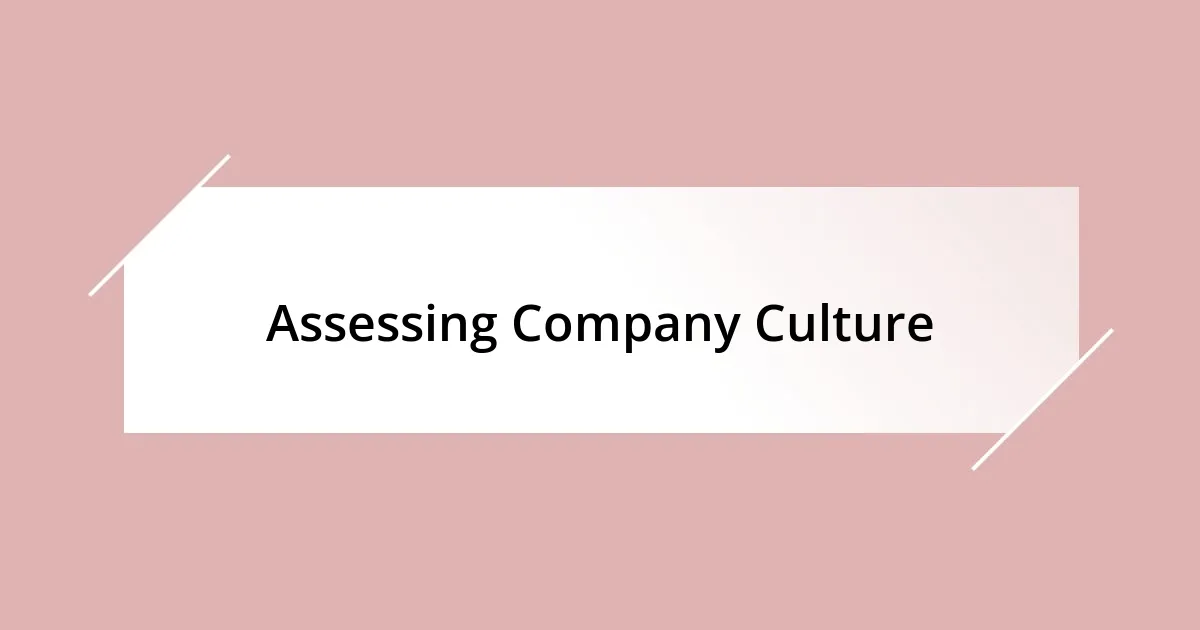
Assessing Company Culture
When I think about assessing company culture, I can’t help but recall a situation where the vibe of the workplace was palpable from the first interview. I remember entering the office and feeling an immediate warmth from the team. It wasn’t just the bright colors and open spaces; it was the genuine laughter and teamwork that were evident. This made me question: How often does a supportive environment contribute to my daily motivation? In my case, it became clear that a positive atmosphere could make a significant difference in job satisfaction.
It’s also essential to dig deeper than the surface-level observations about culture. I learned this the hard way during a company visit where I noticed a stark divide between departments. While the marketing team seemed cohesive and happy, the finance team appeared stressed and isolated. Reflecting on this experience, I began to prioritize asking employees about their day-to-day experiences during interviews. Their candid responses can reveal a lot about what you might encounter if you accept the offer.
In my journey, I’ve come to realize that company values should resonate with personal beliefs for a fulfilling work experience. For instance, I once turned down an offer from a company that championed aggressive competition over collaboration. My intuition told me that such an environment would have drained my passion for teamwork. I think it’s fascinating how aligning your values with those of a company can lead to both personal and professional growth. So, what do you value most in a workplace culture? This insight could ultimately guide you toward a more satisfying career path.
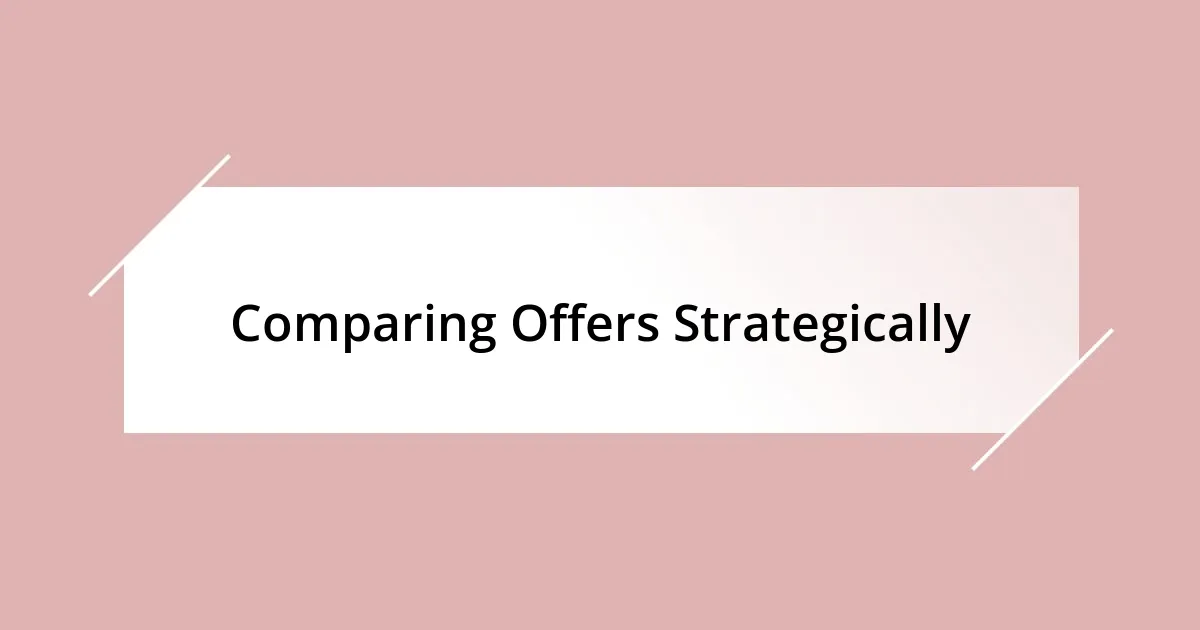
Comparing Offers Strategically
When it comes to comparing offers strategically, I’ve found that creating a pros and cons list can be incredibly revealing. I once had two job offers on the table: one with a higher salary but less flexibility, and the other with a slightly lower pay but the ability to work remotely. By laying it all out, I saw that the value of flexible work significantly outweighed the allure of extra cash for me. Have you ever realized that what might seem like a sacrifice in pay could actually enhance your quality of life?
Another aspect to consider is envisioning your long-term career trajectory with each position. I often ask myself, “Where do I see myself in five years?” With one offer, I felt confident about progressing in my field, while the other left me feeling stagnant. This reflection isn’t just about the numbers; it’s about how each role aligns with my aspirations for growth. It’s essential to think about how an offer fits into your overall career map rather than just focusing on immediate gains.
Lastly, I’ve learned the importance of discussing offers with mentors or trusted friends. I recall a time when I was torn between two offers and reached out to a former manager. Their perspective helped me see nuances I had overlooked—like the potential for professional development at one company that the other lacked. Engaging in these conversations often leads to insights I wouldn’t have considered alone. Have you sought advice before making big decisions? It can be a game-changer in your evaluation process, opening up new angles to think about.
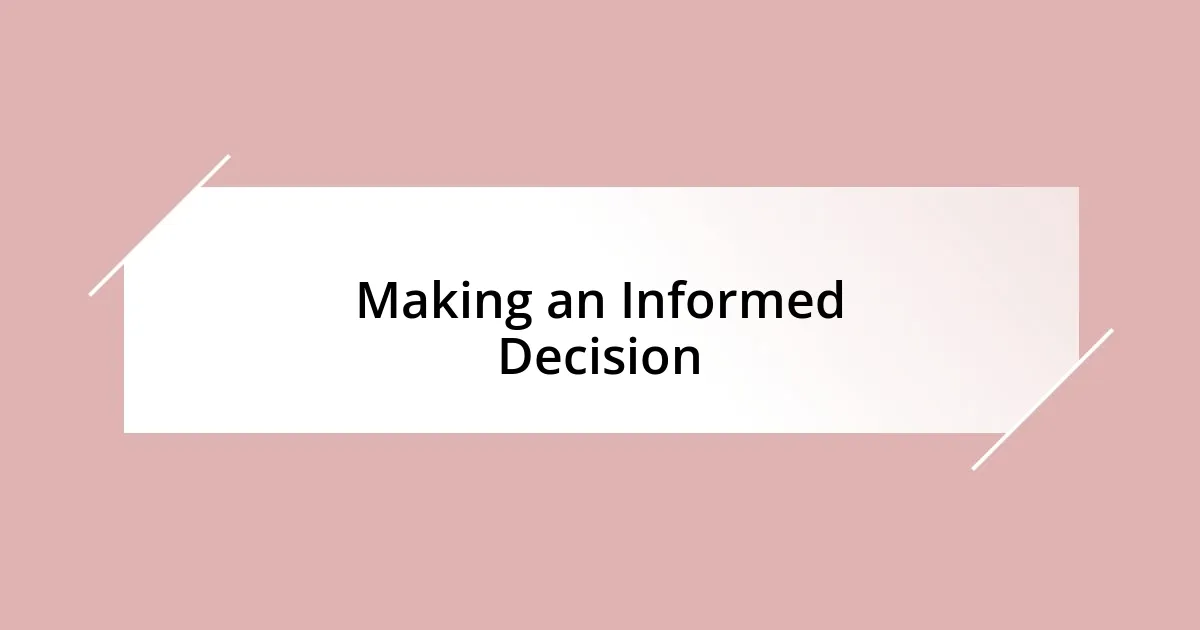
Making an Informed Decision
When it comes to making an informed decision, I can’t stress enough the value of thorough research. I remember when I received an offer from a startup that seemed poised for success but lacked solid financial backing. After spending hours scouring the internet, I discovered some concerning reviews about their stability. This experience taught me that understanding the health of a company should be as important as evaluating the salary. How often do we overlook red flags simply because an offer sounds enticing?
Another key factor is identifying your priorities. For me, it was essential to weigh benefits like health insurance and retirement plans against salary figures. I still recall a time when I accepted a job that offered stellar health benefits but came with a modest salary. In the long run, those benefits saved me a fortune in medical expenses. Have you thought about how hidden costs can impact your take-home pay over time?
Engaging in conversations with current or former employees can provide invaluable insights. During one of my evaluations, I reached out to a few people on LinkedIn who worked at a company I was considering. Their candid feedback about the management style and work-life balance unveiled potential challenges that were not evident in the initial offer. This reinforced my belief that connecting with employees can reveal truths that job postings often skirt around. How much are you willing to learn from those who’ve walked the path before you?














